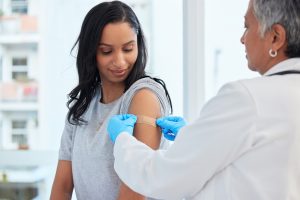As universities are officially out for the summer, we know back to school is the last thing anyone is thinking about. Meningitis is also not likely to be at the top of the list. However, the close quarters of dorm life and frequent social interactions increase the risk of this potentially fatal disease. Meningitis, which causes inflammation of the protective membranes covering the brain and spinal cord, can strike suddenly and progress rapidly, often with serious consequences.
At Queen’s University, several students learned about meningitis the hard way. Those diagnosed with meningitis needed hospitalization, IV antibiotics, and came close to losing their lives.
Fortunately, many forms of meningitis are preventable with vaccines. Here’s what students and parents need to know about meningitis and how to be protected.

Meningitis is a serious infection of the brain and spinal cord linings. The bacteria Neisseria meningititidis is responsible for causing invasive meningococcal disease in the forms of meningitis or septicemia (infection of the blood).
Invasive meningococcal disease is very serious and potentially life-threatening. About 1 in 20 people may die from meningitis, and 4 in 20 people may die from septicemia. Symptoms usually begin with fever, headache, muscle and joint aches, but then can progress into more severe symptoms. Complications of invasive meningococcal disease can include:
-
Brain damage
-
Hearing loss
-
Loss of limbs
Why Students Are at Higher Risk
Meningitis is spread through respiratory secretions and saliva, such as coughing, sneezing, kissing, sharing drinks, utensils, or personal items. A person can be a carrier of the meningococcal bacteria without having symptoms or becoming sick, but is still able to spread the bacteria to other people. About 10 to 20 percent of people are carriers of the bacteria. Most people who become sick with meningitis get it from someone who is a healthy carrier of the bacteria.
In Canada, the risk of meningitis is highest in the winter and spring months, when students are attending school. While relatively rare in Canada (around 200 cases per year), adolescents and young adults aged 15 to 24 years are at higher risk, especially those living in crowded conditions like dorms. Other risk factors include:
-
Exposure to cigarette smoke
-
Current or recent respiratory infection
-
Living in close quarters
Meningitis Vaccines: What You Need to Know
There are 6 serogroups of the meningococcal bacteria that cause meningitis: A, B, C, W, X, and Y. Serogroup B is the most common cause of meningitis in Canada, followed by serogroups W and Y. The introduction of routine vaccination of infants with serogroup C has led to a decrease in cases caused by this serogroup in Canada by 93%.
Vaccines are available in Canada to provide protection against meningitis serogroups A, B, C, W, and Y. As part Bof C’s routine vaccination schedule, infants receive 2 doses of the meningitis C vaccine and adolescents in Grade 9 receive a quadrivalent vaccine to protect against 4 strains of meningitis (ACYW). Protection against meningitis B serogroup is not included in BC’s routine vaccine schedule.
Quadrivalent Meningococcal Vaccines (ACYW)
In BC, Grade 9 students receive a quadrivalent vaccine covering four strains: A, C, W, and Y. This vaccine offers protection for 5 years, typically until age 19, when many students are living in dorms. If it has been more than five years since a student received the meningitis ACYW vaccine, a booster may be recommended before or during college to maintain protection.
Meningitis B Vaccine (Bexsero)
The Bexsero vaccine provides protection against meningitis serogroup B, the most common type in Canada. This vaccine was approved for use by Health Canada in 2013. This vaccine is not included in BC’s routine vaccine schedule.
Adolescents require 2 doses of the Bexsero vaccine at least one month apart. Summer is a good time to complete the series before beginning post-secondary education.
Side Effects of Meningitis Vaccines
The quadrivalent (ACWY) and Bexsero vaccines are safe and effective. Side effects can include:
-
Pain, redness, or swelling at the injection site
-
Fever
-
Fatigue
-
Muscle aches
-
Headache
These side effects are generally mild and resolve within 1–2 days. It’s also safe to receive both vaccines during the same appointment.
Who Needs the Meningitis Vaccines?
The meningitis vaccines are available for purchase at TMVC to anyone 2 months of age and older who wants to be protected against meningitis.
Students living in dorms are at increased risk and should consider getting vaccinated before starting school. Some universities even require proof of vaccination. Other people who may be at increased risk for meningitis and should consider vaccination include:
-
Infants and children under age 5
-
Those without a spleen or a spleen that doesn’t work properly
-
Those with certain immune system disorders
-
Military personnel
-
Lab workers routinely exposed to meningococcal bacteria
-
Travellers to high-risk areas, including the “meningitis belt” in Africa or those attending Hajj or Umrah in Saudi Arabia
How to Book Your Meningitis Vaccine Appointment
While meningitis is rare, it’s a serious disease that progresses quickly. Vaccination is a simple and effective way to reduce risk, especially for students in high-risk environments like dormitories.
Protect your health and your future. Talk to your healthcare provider or contact TMVC to learn more about getting vaccinated before college.
You do not require a prescription to receive the meningitis vaccines at TMVC. Simply call us at 1-888-288-8682 or book online.






